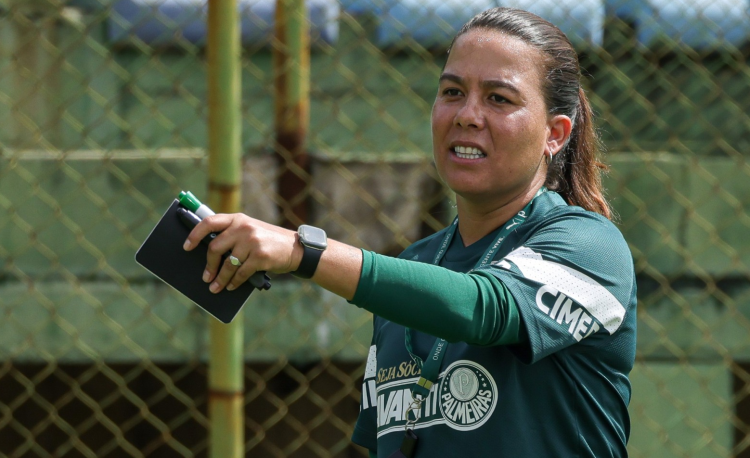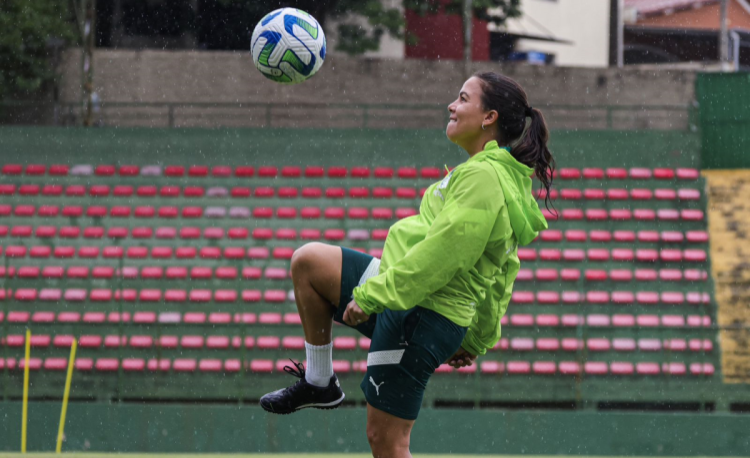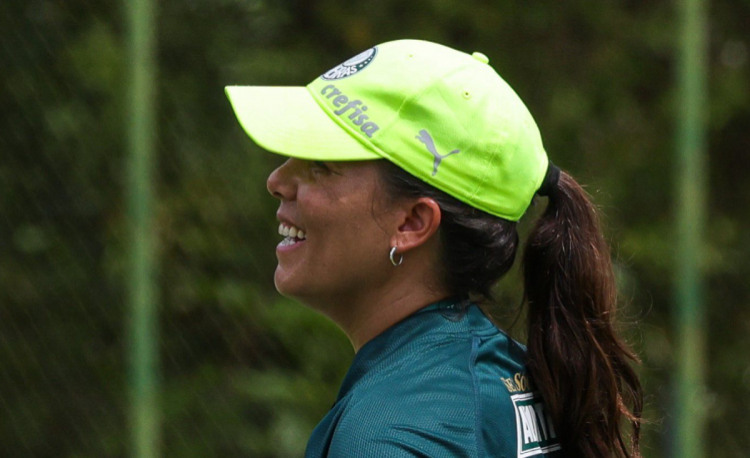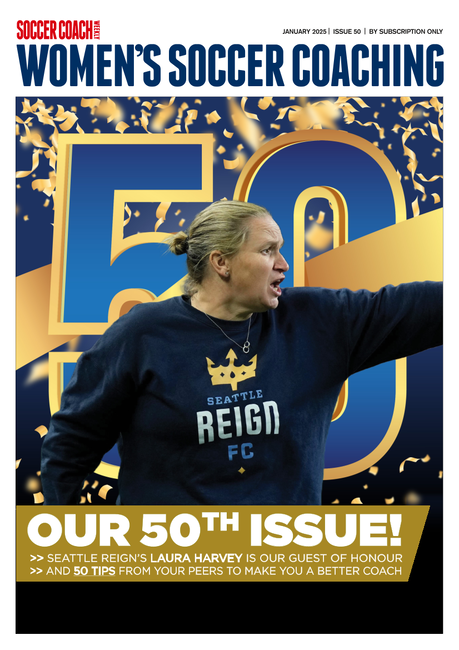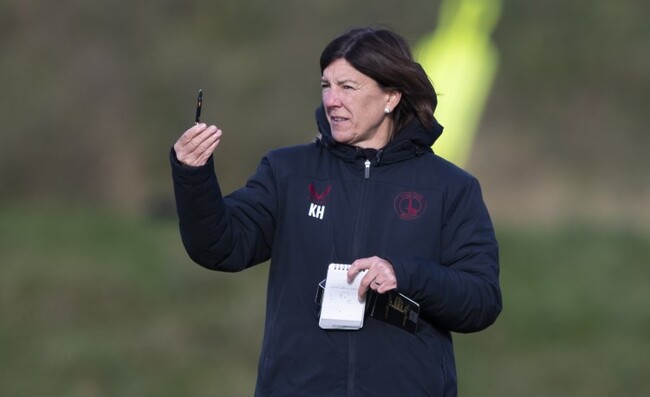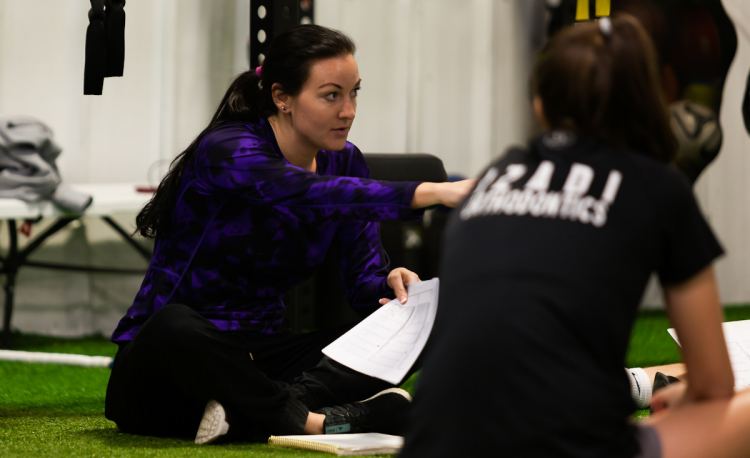You are viewing
1 of your 3 free articles
Camilla Orlando: Chance for change
For Palmeiras head coach Camilla Orlando, soccer has always been about more than just results. She tells Carrie Dunn about her passion for inspiring youngsters, developing the game and her own high ambitions.
“Football was always a mission for me. It was not only about performance, it was more.”
Camilla Orlando’s passion for soccer and the benefits it can bring to its participants has defined her career.
She became the first Brazilian to manage a women’s national team outside of South America when, in 2021, she took the job as head coach of the United Arab Emirates – a country which, she confesses, she had “never even thought about”.
Once she did consider it, though, she came to the conclusion it was an offer she had to accept.
“When these opportunities come, I say, ‘I want to see, with my eyes, the women in the Arabic world, how they play, how strong they are to be playing in this country [and] what can I do to be part of this?’.
“It was going to be amazing [for me], but it was not only about the national team, it was about my mission to develop football, and to fight for women’s equality.”
Improving the lives of girls and women is one of Orlando’s aims, and it stems back to her childhood in Brasilia, playing football on the streets with her friends.
She loved it from the very first kick. Brazil, of course, adores soccer, but that support is directed mostly towards its men’s national team and the leading men’s domestic teams.
In such a vibrant football culture, girls and women are also attracted to the game, but there have been limited options to play it themselves, with a professional women’s league introduced to the country only in 2013.
“When you are a girl playing with boys, you [are called] names that are not so good...”
“For me, I never understood why it was only for boys,” says Orlando. “But at the same time I didn’t think about that.
“It was hard for me because, when you are a girl playing only with boys, you [are called] some names that were not so good.
“But my passion for the game was so big, I said, ‘I don’t mind. You can do everything but I’m going to be here, playing this game’.”
As a teenager, Orlando combined playing with her first steps into coaching local sides, before taking up a student athlete place in the US with Lincoln Memorial University.
“When I was in high school, one of my friends came back from an English program in the US, and he told me, ‘Camilla, you need to go to the US and play there’,” she recalls.
“At that moment, he put a seed in my heart. That started to be my biggest dream.”
The team she was coaching also spurred her on – she was working with a US-style high school in Brazil, and the American students there knew how big women’s soccer was in the college system.
“My players told me, ‘Coach, you have to go. You’re going to love it. You’re going to be playing but also going to be having a great experience!’”
Spending time in the US college system transformed Orlando’s perspective on football. She loved playing, and was grateful for the chance to improve her English skills.
But, on her return to Brazil, she decided that she should focus on coaching – or, as she describes her work, “football development”.
“When I came back from the USA, I had a different mind about training, about coaching,” she says.
“As a player, I could not be changing too much [about] the game and I saw a lot of gaps to do that. I kept trying to push my coaches and say, ‘Let’s do something better. Let’s do better preps. Let’s be more responsible with the game, with the players’.
“The coaches, at that point, said: ‘This is how women’s football is’.”
Orlando thought differently. Women’s soccer might have been operating in a particular way for a long time, but she believed there was chance for change – and it was the coach’s responsibility to consider their own contributions.
“If we develop ourselves as a coach, we can help to improve the game,” she said.
“I realised that they’re not going to be doing this. This is something that I believe in, so at that moment I said, ‘I need to do more for the game now’.”
Orlando was then 27 years old – still a relatively young coach, pursuing her qualifications. She saw so many flaws in the football set-up, not least of which was the provision for young girls who loved the game, just as she had done.
“Young players didn’t have opportunity – only the good ones. If you were a 12-year-old girl, a very good one, you were going to be playing with adults.
“But if you were a 12-year-old girl and still needing something more to develop and learn, maybe you were not going to be playing.”
It was this that inspired her to found Capital Feminina, which has since transformed into the Camilla Orlando Women’s Football Academy.
“Football is for everyone – not only the ones who are good,” she says.
“If you go to the street, you will see, like, a thousand boys playing. Maybe they’re not good – they’re not going to be professional. [But] they like to play. It’s a good environment, a good group of friends.
“I keep saying to my players, ‘the best thing football gave to me was an education and my friends’.
“I want to also give this opportunity to the Brazilian girls: not only to become a football player – of course, that was something that was in my mind – but to enjoy the game, because the game can give you a lot of stuff.
“Maybe I was not a pro [player], but the game gave me something.”
Brazil has revamped its women’s football provision in the years since Capital Feminina’s creation, with big men’s clubs obliged to also offer teams for women and girls.
But though they may have had resources and facilities now, they did not have many coaches with experience of working with female players, which opened more doors for Orlando.
In 2019, she coached SC Internacional’s U18s to the national championship, and the following year became head coach for Red Bull Bragantino’s inaugural women’s team.
HOW THE OLYMPICS INSPIRED CAMILLA TO SEIZE ‘LITTLE BALL’S POWER
Related Files
Brazil hosted two of the biggest sporting events in the world in the space of two years – and Camilla Orlando was part of both.
In the 2014 Fifa men’s World Cup, she worked in competition logistics, getting unparalleled access to the squads in training and on matchday.
Two years later, during the 2016 Olympic Games, she took up another role with the local organising committee.
The Olympics has long been one of the most prestigious competitions for women’s soccer, and seeing some of the best teams compete at close quarters gave her more impetus for her own career.
“I already knew how big the game is,” she says, looking back on 2016, “but in that moment, I said, ‘This little ball has a power that is fantastic. I need to learn how to use this to impact more girls’ lives and do this for women as well’.”
Again, for Orlando, women’s involvement in soccer does not necessarily mean playing professionally: “Maybe even if you’re not a player, you can cheer for your team, or you can have a conversation with your family about football.”
‘maybe i could be coaching brazil one day’ – how a set of inspirational female leaders shifted camilla’s perspective
The 2016 Olympic Games was significant for Orlando, because she got to see female coaches working at the top level.
The likes of Vera Pauw, Pia Sundhage, Silvia Neid and Jill Ellis were all leading squads during the tournament, and made Orlando assess her own ambitions.
“They inspired me. I wanted to be a coach like them, to be coaching in the Olympic Games’,” she says.
“Before that I wanted to be a coach, but I didn’t know how big I could be as a coach.”
Shortly after the tournament, Brazil’s women’s national team appointed their first ever female head coach in Emily Lima, now head coach of Peru.
“Before that, it was only men,” says Orlando, “and then when she became coach, I said, ‘Oh my gosh, so maybe I could also be coaching the Brazil national team some day’.”
It gave her renewed impetus to pursue all her coaching qualifications.
“I also want to be a strong woman,” she says, adding that she never wanted to give anyone the opportunity to doubt her knowledge or ability.
“They’re not going to have any [chance] to say, ‘You’re not able to be here.’ I’m going to be doing everything that I can do to be ready.”
Her impact was immediate, leading them to the second division title and promotion.
Instead of stepping up with her club side, though, she chose to pursue the opportunity of coaching the UAE women’s national team.
It was a role that gave her plenty of scope to have a positive effect on the game’s structure; she suggests that the UAE’s current situation is similar to where Brazil were 10 years ago.
“I could see how the women love the game,” she recalls, adding that she also got the opportunity to learn from colleagues on the staff, who came from countries ranging from Portugal to Morocco.
Understanding different football cultures has helped her to expand her own practice and herself as a person; she describes the prospect of working in the UAE as something that “might be changing me more than only as a coach”.
And Orlando urges all coaches to approach their roles with curiosity and openness.
“Everyone has something to teach you about the game, because it doesn’t matter where they’re from.
“If they love the game, they have something to share [with] you. I think that’s the biggest thing that I learned – new ways.”
Even while she was working in the UAE, she was keeping a close eye on developments back in Brazil, and felt a strong pull to return.
Watching the growth of clubs and competitions made her think that she still had more to offer back at home.
“Keep believing. Don’t let anyone tell you [that] you are not able to do it. Keep strong...”
“I said, ‘I shared a little bit here in UAE, but I think that I still have some to learn and help the game in Brazil’,” she explains.
Since the start of 2024 she has been head coach at Palmeiras, the Sao Paulo club most famous because of the achievements of their men’s team, who have won 12 league titles and multiple other cups and competitions, and will compete alongside Real Madrid, Manchester City and others in the inaugural Fifa Club World Cup in 2025.
The women’s team have not yet enjoyed quite so many honours – although they did win the Copa Libertadores Femenina in 2022 – the possibilities and potential are endless.
“That’s why I prepare myself as a coach, to be a coach at a club like Palmeiras,” says Orlando. “It was amazing.”
So after her adventures around the world, Orlando is back in her native Brazil, with the aim not just of coaching her team to success, but also acting as a role model for girls who harbour secret dreams of creating a career in the sport they love – just as she did.
Asked what advice she would give her teenage self, Orlando becomes a little emotional as she reflects on what she has achieved so far and how much soccer means to her.
“Keep believing,” she says. “If you give your first step, the world is going to help you do the other steps.
“Don’t let anyone tell you [that] you are not able to do it. Keep strong.”
Newsletter Sign Up
Newsletter Sign Up
Discover the simple way to become a more effective, more successful soccer coach
In a recent survey 89% of subscribers said Women's Soccer Coaching makes them more confident, 91% said Women's Soccer Coaching makes them a more effective coach and 93% said Women's Soccer Coaching makes them more inspired.
*includes 3 coaching manuals
Get Inspired
All the latest techniques and approaches
Women's Soccer Coaching offers proven and easy to use soccer drills, coaching sessions, practice plans, small-sided games, warm-ups, training tips and advice.
We've been at the cutting edge of soccer coaching since we launched Soccer Coach Weekly in 2007, creating resources for the grassroots youth coach, following best practice from around the world and insights from the professional game.
